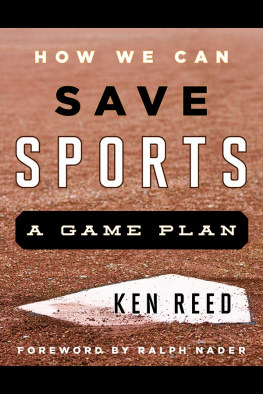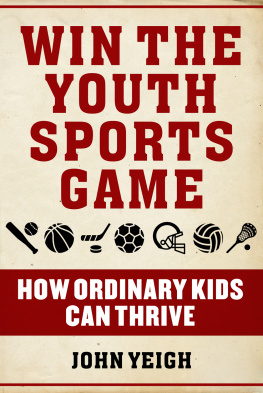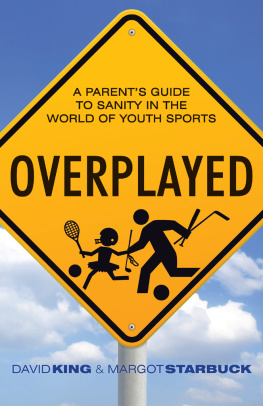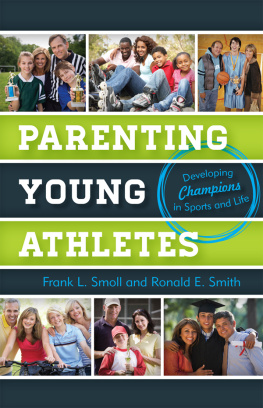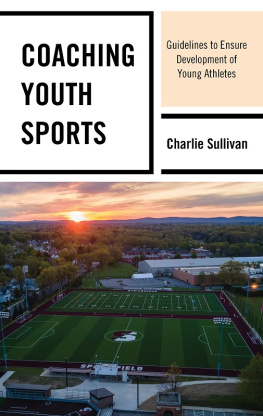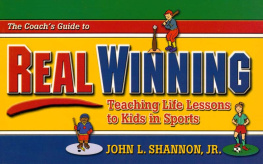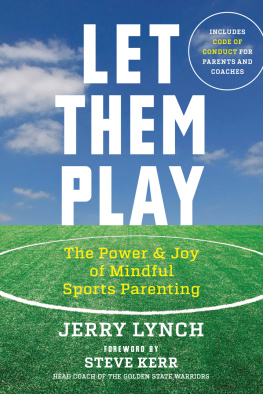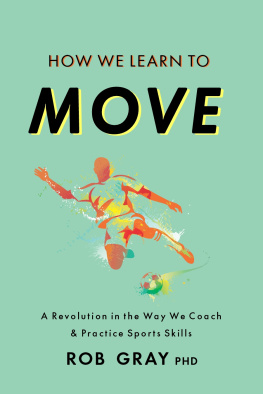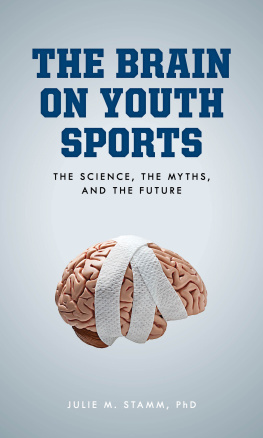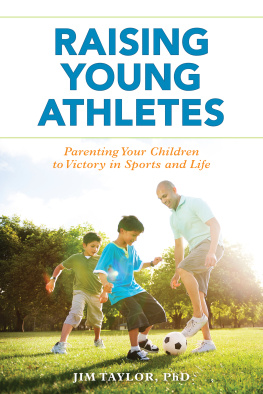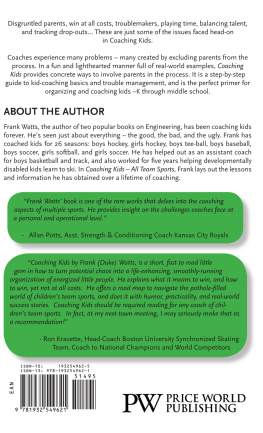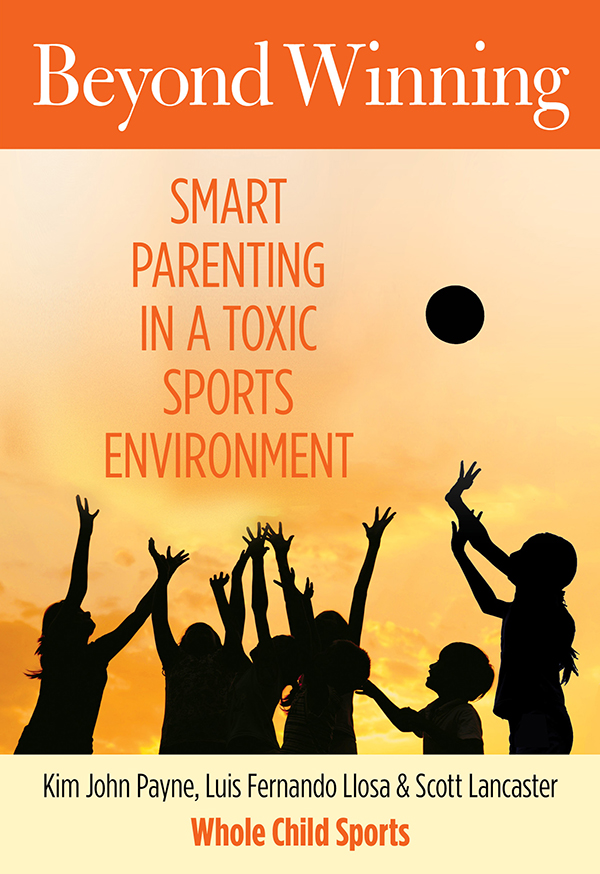Beyond Winning
Smart Parenting in a Toxic Sports Environment
Kim John Payne,
Luis Fernando Llosa, and
Scott Lancaster
Copyright 2013 by Kim John Payne, Luis Fernando Llosa, and Scott Lancaster
ALL RIGHTS RESERVED. No part of this book may be reproduced or transmitted in any form by any means, electronic or mechanical, including photocopying and recording, or by any information storage and retrieval system, except as may be expressly permitted in writing from the publisher. Requests for permission should be addressed to Globe Pequot Press, Attn: Rights and Permissions Department, P.O. Box 480, Guilford, CT 06437.
Lyons Press is an imprint of Globe Pequot Press.
All illustrations courtesy of Katharine Payne
Project editor: Ellen Urban
Layout: Mary Ballachino
Library of Congress Cataloging-in-Publication Data is available on file.
ISBN FIX THIS
In some cases identifying details, including names, have been changed to preserve the anonymity of parents or children.
To all parents who remember the joy of unhurried, creative play and wish to give this most precious of all gifts to their own children. Many blessings on your parenting path.
KJP
For Mary, my guiding light, and for our fabulous five: Chai, Isabel, Will, Gabriel, and Inigo, who have taught me everything I know and dont know about parenting and coaching.
LFLL
For my son Justin, who has taught me the most important reasons behind participation and sports.To Xiomara for her inspiration, support, and all that I continue to learn from her.
SL
Contents
Introduction
Every childs life unfolds in its own unique way. Our role as parents is to nurture our children and guide them as they grow into strong, healthy, independent individuals. How then can we shield our children from todays intoxicating youth sports culture, which sweeps us all into its swirling vortex and subjects our kids to too much, too soon? Caught up in a cultural frenzy, we clutter our childrens daily lives with too many sporting activities and, though often unwittingly, pressure our child-athletes to perform. As a result they grow up too quickly, and often the foundations of our family lives are fractured.
At Whole Child Sports we want to slow things down a bit and give kids the time they need to develop wholesomely. They will thrive and can reach their full potential as athletes and adults if they are taught in developmentally appropriate stages. Ours is a holistic approach to teaching sports to children. To begin with, we, as parents, can train ourselves to change the way we think as a first step toward providing a healthier sports experience for them. If we can abandon our fantasies of vicarious stardom, if we can take a few steps back and give our kids some space to grow and learn, and if we can temper our expectations and become more mindful, the fog will lift. Then, with clarity, we can create a fun-filled, relatively pressure-free environment in which our children can flourish.
In this book we offer an alternative approach to teaching sports to kids that de-emphasizes short-term goals like winning games and youth championships and discourages the early introduction of adult-oriented, league-structured competition. We recommend that parents learn more about their own sports biographies so that they can temper their influence over their childs sports experiences, which, in the younger years, should include a healthy diet of free play and loosely structured skill-building activities. This approach includes training techniques and coaching strategies aimed at developing core strength, balance, and creativity in aspiring athletes, and it educates parents and coaches alike about our four stages of age-appropriate, healthy play.
What is abundantly clear is that we, as parents, need to take action. Thats why Scott Lancaster, Kim John Payne, and I have formed Whole Child Sports. We come from disparate professional and personal backgrounds but are united in our growing alarm at the toxic nature of todays youth sports culture. Increased television coverage, big money sponsorship, and the predominance of a win-at-all-costs mentality, promoted by misguided coaches and overbearing parents, have all contributed to the poisoning of childhood sports experiences, which should be fun, skill building, and stress-free.
Lets take a closer look at todays toxic youth sports mind-set. Why do even the most conscientious parents and educators devolve into did-you-win drones when talking to kids about their experiences on the field? Instead of Was it fun? its always, Did you win? What was the score? Well, at least it was close, right? Weve all engaged in this conversation or overheard it countless times. And the message to our kids is crystal clear: Winning is the ultimate goal, the answer to everything, the holy grail of athletic pursuit.
When such cultural attitudes are pervasive, sportsmanship, fair play, and, most important, learningwhich should be paramount for kids playing sports up to the age of eighteenare sacrificed at the altar of victory. Parents focus on winning. They make financial and family-time decisions in service to victory. Coaches make team decisions, from participation to player playing time to training priorities, in deference to winning.
As ESPNs Tom Farrey points out in Game On: How the Pressure to Win at All Costs Endangers Youth Sports and What Parents Can Do About It, his eye-opening account of the youth sports landscape, the obsession with early success in a win-at-all-costs culture has created a pressure chamber in which top prospects, even at the age of five or six, are funneled into elite programs while the majority of kidsthe weak onesare robbed of the opportunity to discover and develop their talents.
Wheres the fun and athletic development? And what about the steep human cost? In this ultracompetitive culture, the darkest demons of the sports world run rampant. Cheating, physical and emotional abuse, bullying, and violence become endemic. The result is a youth sports landscape pockmarked with children who end upat age eleven or twelvewith fractured egos, low self-esteem, and, in some cases, severe physical injuries. Its why millions of American kids quit organized sports just as they become teenagers. And why thousands of parents weve spoken to are so anxious and concerned.
The tens of thousands of volunteers who dedicate much, if not all, of their weekends (and many weeknights) to organize, coach, and support youth sports programs do so with the best of intentions. We all want whats best for our children. But what many of us parents and coaches are unaware of is that there are more dynamic and holistic ways for our children to learn, play, and compete than that old-school approach we were exposed to as kids.
Epictetus once said, It is impossible for a man to learn what he thinks he already knows. These insightful words help explain why youth sports has evolved so little orto be candiddevolved so much in the United States over the past twenty-five years. Think about it. What has changed since we were kids? We grew up participating in a system that mimics professional and elite-level sports. Its a setup defined by scheduled practices, league play, and, at its pinnacle, elite travel team competition. The people who run organized sportslets call them traditionalistspromote the status quo. Its what they know, are comfortable with, and can control.
Late Hall of Fame NFL football coach Bill Walsh argued, A good coach never stops learning and always keeps an open mind. As parents and coaches we should all take heed. Its time we think about changing the traditional framework of youth sports. We know change doesnt come easily, especially when it threatens a long-standing culture that has established and validated the identities of thousands of individualscoaches, league administrators, commissionerswithin their communities. But our youth sports system is deeply flawed. The kids have made it clear: More than 70 percent quit organized sports by the age of thirteen. Its time to redefine the paradigm.


